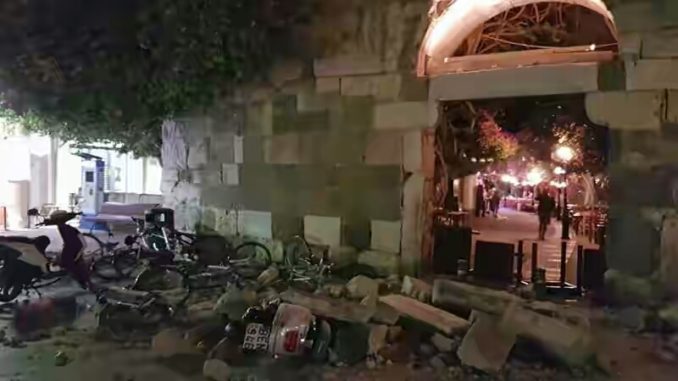
At least two people were killed on the Greek island of Kos on Friday when a magnitude 6.7 earthquake shook the popular summer resort holiday destinations of the Dodecanese Islands in Greece and the Aegean coast of Turkey.
The island of Kos was nearest to the epicentre and appeared to be the worst-hit. Giorgos Halkidios, Kos regional government official, said the number of injured was more than 100.
“Two or three of them are in serious condition and are in surgery,” he said.
He said the injured included people who were underneath a building that collapsed. Ferry services were suspended due to damage at Kos’s main port, where a 14th-century fortress also was damaged. A minaret from an old mosque also was damaged.
Minor damage – cracks in buildings, smashed windows and trashed shops – appeared widespread, according to city officials.
“The rest of the island has no problem. It’s only the main town that has a problem,” Kos Mayor Giorgos Kyritsis told state-run Greek media. “The buildings affected were mostly old, and were built before the earthquake building codes were introduced.”
The epicentre of the quake was approximately 10.3 kilometres south of the major Turkish resort of Bodrum, a magnet for holidaymakers in the summer, and 16.2 kilometres east of the island of Kos in Greece, the US Geological Survey said.
It had a depth of 10 kilometres, USGS said.
In the Turkish resort of Bodrum, television pictures showed throngs of worried residents and holidaymakers in the streets.
“The biggest problem at the moment are electricity cuts in certain areas (of the city),” Bodrum mayor Mehmet Kocadon told NTV television.
“There is light damage and no reports that anyone has been killed” in the area.
Reports said the state hospital in Bodrum was evacuated after cracks appeared, with incoming patients being examined in a garden outside.
The governor of the southern Mugla province – where Bodrum is located – said some people had been slightly injured after falling out of windows in panic.
‘I was very scared’
The Adliye mosque in central Bodrum suffered some damage, with police cordoning it off to prevent people being wounded by fallen debris, the state-run Anadolu news agency said.
Turkish television said the earthquake triggered high waves off Gumbet near Bodrum which flooded the road and left parked cars stranded. There were no reports of casualties.
An AFP correspondent holidaying in Bodrum said the quake was followed by aftershocks.
“The bed shook a lot. Some bottles fell and broke in the kitchen and the patio,” said Turkish pensioner Dilber Arikan, who has a summer house in the area.
“I screamed I was very scared because I was alone.”
The quake was also felt on the Greek island of Rhodes.
“We were very surprised. We were scared and we immediately went outside,” Teddy Dijoux, who was holidaying with his family at a Rhodes resort, told AFP.
“That lasted a long time. I quickly gathered up my children to leave the hotel,” said holidaymaker Sylvie Jannot.
Turkey and Greece sit on significant fault lines and have regularly been hit by earthquakes in recent years.
This year alone, Turkey’s western Aegean coast was hit by several significant earthquakes, which brought back memories of past deadly earthquakes.
In June, a 6.3-magnitude earthquake gutted a village on the Greek island of Lesbos, killing a woman and leaving more than 15 injured. The quake also caused panic on Turkey’s Aegean coast.
On August 17, 1999, a huge earthquake measuring more than 7.0 magnitude near the city of Izmit devastated vast areas in the country’s densely populated northwestern zone, notably around Istanbul, killing over 17,000 people.
